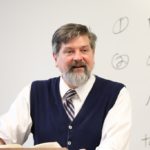What role does God play in the political order? This course will reflect on the “place” of God in the nature and destiny of man and human existence, and therefore in the organization of that existence in community. We will focus above all on the fundamental difference between the ancients and the moderns in the conception of the nature of politics and political authority, and see how Christianity transforms the horizon of politics, introducing a new complexity to the problem. Although the approach we will take in the course will be principally philosophical, we will read some classic historical studies of political community in the ancient and medieval worlds, in addition to more thematic studies that set into relief the principles governing the question. Some of those authors include philosophers Plato, Aristotle, Hobbes, Locke, Rousseau, de Koninck, and Maritain, as well as the historians de Coulanges and Kantorowicz.
Selected Texts
Oliver O’Donovan and Joan Lockwood O’Donovan (eds.), From Irenaeus to Grotius: A Sourcebook in Christian Political Thought.
Plato, Republic.
Richard McKeon (ed.), The Basic Works of Aristotle.
Numa Denis Fustel de Coulanges, The Ancient City: A Study on the Religion, Laws, and Institutions of Greece and Rome.
Ernst H. Kantorowicz, The King’s Two Bodies: A Study in Medieval Political Theology.
Carl Schmitt, Political Theology II: The Myth of the Closure of Any Political Theology.
Jacques Maritain, The Person and the Common Good.
Erik Peterson, Theological Tractates.
Faculty

D.C. Schindler
Professor of Metaphysics and Anthropology
Ph.D. Program Advisor
Dr. Schindler’s work is concerned above all with shedding light on contemporary cultural challenges and philosophical questions by drawing on the resources of the classical Christian tradition. His principal thematic focus is metaphysics and philosophical anthropology.
Learn More